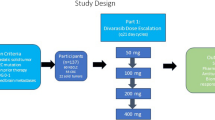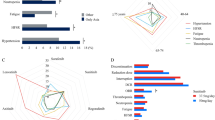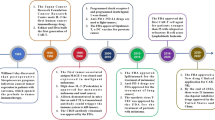Abstract
Conventional cytotoxic chemotherapeutic drugs treat cancer either by direct killing or by inhibition of growth of cycling tumor cells. In addition, evidence suggests that cytotoxic agents may inhibit tumor growth through an antiangiogenic mechanism. "Metronomic" or frequent continuous administration of the same chemotherapeutic agents at lower doses may optimize their antiangiogenic properties. The effectiveness of metronomic chemotherapy regimens can be improved significantly by concurrent administration of antiangiogenic, endothelial-specific drugs. Preclinical studies have shown that integrating chemotherapy with antiangiogenic drugs can improve efficacy and circumvent the toxicity and drug resistance associated with standard or high-dose chemotherapy. Preliminary clinical studies have shown similar results. Further confirmation of this concept is required with randomized, controlled clinical trials.
Similar content being viewed by others
References and Recommended Reading
Hanahan D, Bergers G, Bergsland E: Less is more, regularly: metronomic dosing of cytotoxic drugs can target tumor angiogenesis in mice. J Clin Invest 2000, 105:1045–1047.
Hanahan D, Weinberg RA: The hallmarks of cancer. Cell 2000, 100:57–70.
Hanahan D, Folkman J: Patterns and emerging mechanisms of the angiogenic switch during tumorigenesis. Cell 1996, 86:353–364.
Weidner N, Semple J, Welch W, et al.: Tumor angiogenesis and metastasis-correlation in invasive breast cancer. N Engl J Med 1991, 324:1–8.
Browder T, Butterfield CE, Kraling BM, et al.: Antiangiogenic scheduling of chemotherapy improves efficacy against experimental drug-resistant cancer. Cancer Res 2000, 60:1878–1886. In this preclinical study, metronomic scheduling showed impressive antitumor effects and reversal of acquired drug resistance.
Stoler DL, Chen N, Basik M, et al.: The onset and extent of genomic instability in sporadic colorectal tumor progression. Proc Natl Acad Sci U S A 1999, 96:15121–15126.
Folkman J, Hahnfeldt P, Hlatky L: Cancer: looking outside the genome. Nature Rev Mol Cell Biol 2000, 1:76–79.
Kerbel RS: Inhibition of tumor angiogenesis as a strategy to circumvent acquired resistance to anti-cancer therapeutic agents. Bioessays 1991, 12:31–36.
Crawford J, Ozer H, Stoller R, et al.: Reduction by granulocyte colony-stimulating factor of fever and neutropenia induced by chemotherapy in patients with small cell lung cancer. N Engl J Med 1991, 325:164–170.
Kaban LB, Mulliken JB, Ezekowitz RA, et al.: Antiangiogenic therapy of recurrent giant cell tumor of the mandible with interferon alpha-2a. Pediatrics 1999, 103:1145–1149.
Eberhard A, Kahlert S, Goede V, et al.: Heterogeneity of angiogenesis and blood vessel maturation in human tumor: implications for antiangiogenic tumor therapies. Cancer Res 2000, 60:1388–1393.
Miller KD, Sweeney CJ, Sledge GW: Redefining the target: chemotherapeutics as antiangiogenics. J Clin Oncol 2001, 19:1195–1206. An excellent article describing in vitro and in vivo assays of angiogenesis. A summary of studies shows the antiangiogenic activity of most classes of chemotherapeutic agents.
Gately S, Kerbel R: Antiangiogenic scheduling of lower dose cancer chemotherapy. Cancer J 2001, 7:427–436.
Klement G, Baruchel S, Rak J, et al.: Continuous low-dose therapy with vinblastine and VEGF receptor-2 antibody induces sustained tumor regression without overt toxicity. J Clin Invest 2000, 105:R15-R24.
Wild R, Ghosh K, Dings R, et al.: Carboplatin differentially induces the VEGF stress response in endothelial cells: potentiation of anti-tumor effects by combination therapy with antibody to VEGF [abstract]. Proc Am Assoc Cancer Res 2000, 40:307.
Shan M, Bocci G, Francia G, et al.: Antitumor effects in mice of low-dose (metronomic) cyclophosphamide administered continuously through the drinking water. Cancer Res 2002, 62:2731–2735.
Klement G, Huang P, Mayer B, et al.: Differences in therapeutic indexes of combination metronomic chemotherapy and an anti-VEGF-2 antibody in multidrug-resistant human breast cancer xenografts. Clin Cancer Res 2002, 8:221–232.
Engelsman E, Klijn J, Rubens R, et al.: ‘Classical’ CMF versus a 3-weekly intravenous CMF schedule in postmenopausal patients with advanced breast cancer. Eur J Cancer, 1991, 27:966–970.
Lopes N, Adams E, Pitts T, et al.: Cell kill kinetics and cell cycles effects of Taxol on human and hamster ovarian cell lines. Cancer Chemother Pharmacol 1993, 32:235–242.
Seidman A, Hudis C, Albanel J, et al.: Dose-dense therapy with weekly 1-hour paclitaxel infusions in the treatment of metastatic breast cancer. J Clin Oncol 1998, 16:3353–3361.
Green M, Buzdar A, Smith T, et al.: Weekly paclitaxel followed by FAC as primary systemic chemotherapy of operable breast cancer improves pathologic complete response rates when compared to every 3-week paclitaxel therapy followed by FAC: final results of a prospective phase III randomized trial [abstract]. Proc ASCO 2002, 21:35a.
Burstein H, Manola J, Younger J, et al.: Docetaxel administered on a weekly basis for metastatic breast cancer. J Clin Oncol 2000, 18:1212–1219.
Sedky L, El-Dine I, Hashem B, et al.: Weekly docetaxel vs every 3-week in advanced breast cancer: results of a pilot comparative study [abstract]. Proc ASCO 2002, 21:505a.
Colleoni M, Rocca A, Sandri T, et al.: Low dose oral methotrexate and cyclophosphamide in metastatic breast cancer: antitumor activity and correlation with vascular endothelial growth factor levels. Ann Oncol 2001, 12:73–80. This phase II study showed clinical efficacy and decreased toxicity with metronomic scheduling for oral chemotherapy in patients with metastatic breast cancer.
Ellis GK, Livingston RB, Gralow JR, et al.: Dose-dense anthracycline-based chemotherapy for node-positive breast cancer. J Clin Oncol 2002, 20:3637–3643.
Author information
Authors and Affiliations
Rights and permissions
About this article
Cite this article
Kaur, H., Budd, G.T. Metronomic therapy for breast cancer. Curr Oncol Rep 6, 49–52 (2004). https://doi.org/10.1007/s11912-996-0009-5
Issue Date:
DOI: https://doi.org/10.1007/s11912-996-0009-5




